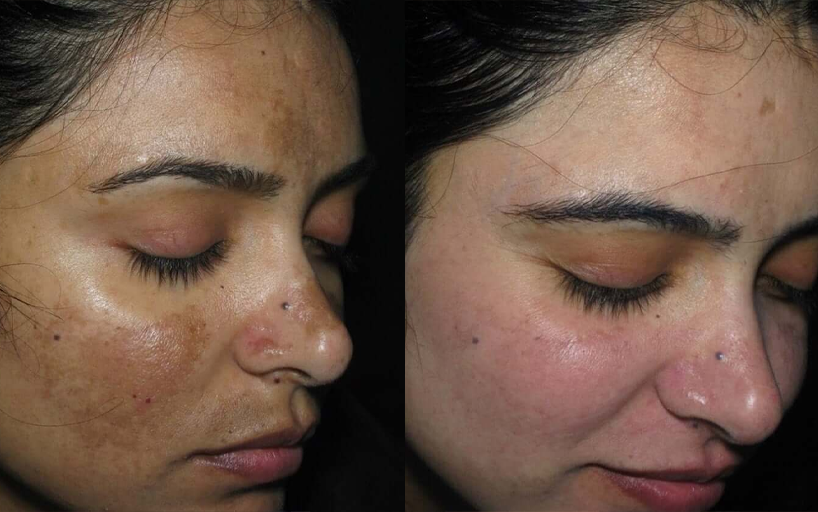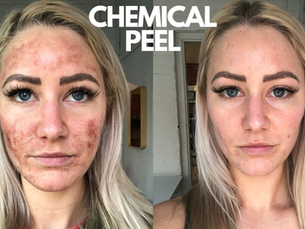
The Symptoms
Dark Spots
Flat, brown or black patches caused by sun damage or aging.
Melasma
Symmetrical, blotchy patches—often on the cheeks, forehead, or upper lip, common in women.
Post-Inflammatory Hyperpigmentation (PIH)
Dark marks left behind after acne, burns, or skin injuries.
Freckles
Small brown spots that often darken with sun exposure.
Sunspots (Lentigines)
Larger, sun-induced spots that appear over time—especially on face, chest, and hands.
Uneven Skin Tone
General discolouration or patchiness that gives a dull, blotchy appearance.

Pigmentation refers to patches of skin that become darker than the surrounding area due to excess melanin. This can appear as sunspots, melasma, post-acne marks, or uneven skin tone. While pigmentation isn’t usually harmful, it can be distressing and affect confidence—especially when it appears on the face or hands.
At Manchester Dermatology Clinic, we offer expert assessment and tailored treatments to help fade pigmentation and restore a more even, radiant complexion.
Pigmentation can be triggered by a range of factors, including:
-
Sun exposure (the most common cause)
-
Hormonal changes (e.g. pregnancy, contraception)
-
Inflammation or injury to the skin (post-acne, burns, etc.)
-
Certain medications
-
Genetics
Understanding the cause is key to choosing the right treatment.
-
Some types of pigmentation—like mild post-inflammatory marks—may fade over time. But deeper conditions like melasma or long-term sun damage usually won’t resolve without treatment. Early professional care can prevent it from worsening and help improve results faster.
Yes. But darker skin tones need extra care to avoid over-lightening or rebound pigmentation. Our dermatologists use tailored protocols to treat pigmentation safely and effectively across all skin types.
Pigmentation Correction Pricing
Pigmentation Correction (Adult)
Dermatology Consultation
Personalised Treatment plan
From £120
Types of Treatments

Topical Treatments
01
For most types of pigmentation, especially post-inflammatory marks and sunspots, topical treatments are the foundation. These may include:
-
Hydroquinone – a prescription-only skin lightener
-
Retinoids – to boost cell turnover and fade pigment
-
Azelaic acid or Kojic acid – gentle brighteners for sensitive skin
-
Vitamin C – to reduce dullness and boost glow
Our dermatologists create personalised routines to improve clarity without irritating the skin.

In-Clinic Procedures
02
When topical options aren’t enough, we offer powerful, results-driven treatments:
-
Chemical Peels
Medical-grade peels exfoliate the skin, remove dull layers, and fade pigmentation. Ideal for melasma, sunspots, and acne marks. -
Laser Treatments (e.g. Nd:YAG, IPL)
Target pigment deep in the skin and break it down safely. Effective on stubborn or dermal pigmentation. -
Microneedling + Serums
Boosts collagen and enhances delivery of pigmentation-fighting ingredients directly into the skin.
These are performed with care, especially on deeper skin tones, to avoid rebound pigmentation or overcorrection.

Internal or Hormonal Support
03
Some pigmentation, like melasma, is linked to hormonal shifts. In these cases, we may recommend:
-
Oral Tranexamic Acid – shown to reduce stubborn melasma
-
Lifestyle and sun protection advice – crucial for prevention
-
Tailored skincare maintenance – to prevent recurrence after treatment
Our Expert Dermatologist.
Our expert dermatology team combines medical excellence with a personalised approach.
Led by GMC-registered consultants, we bring years of experience in treating both complex skin conditions and delivering advanced cosmetic care. At Manchester Dermatology Clinic, you’re in the hands of trusted specialists who are dedicated to helping you feel confident in your skin.
Consultant Dermatologist
Dr. Sarah Quill

Dr. Quill is passionate about treating both medical and cosmetic concerns, from eczema and psoriasis to pigmentation and ageing skin.
Dermatology Practitioner
Syedehzahara

With a strong foundation in clinical dermatology, Syedehzahara provides expert support in diagnosing and managing a wide range of skin conditions.
Consultant Dermatologist
Dr.Morgan James

With over 15 years of clinical experience, Dr. James specialises in mole checks, skin cancer screening, and minor dermatological surgery.










